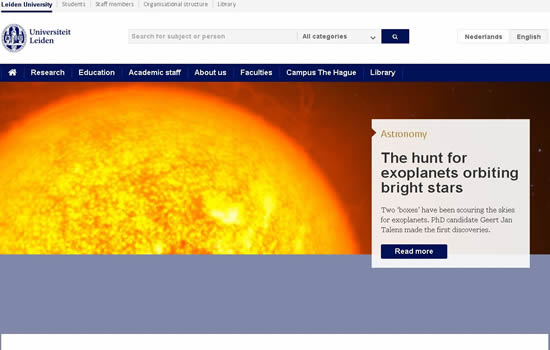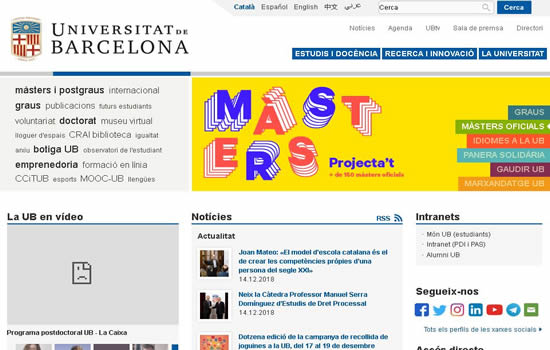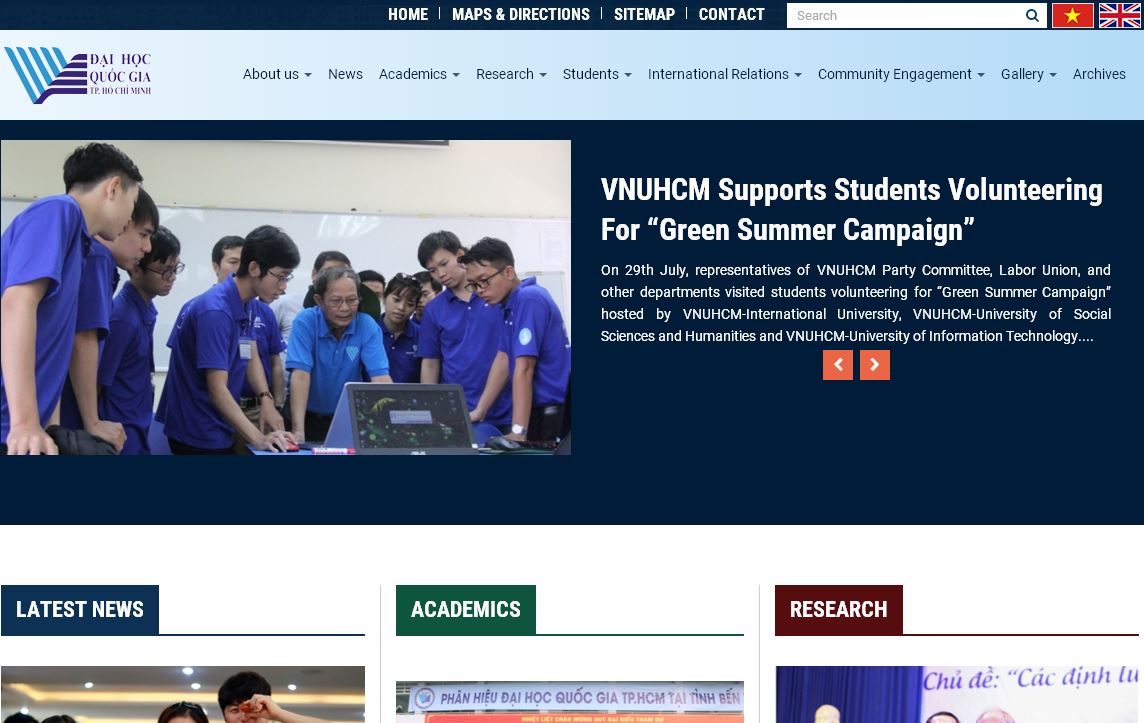选择热点
 荷兰莱顿大学
荷兰莱顿大学 西班牙巴塞罗那大学
西班牙巴塞罗那大学 巴西圣保罗大学 University of Sao Paulo, Brazil
巴西圣保罗大学 University of Sao Paulo, Brazil 台湾南华大学 University of South China in Taiwan
台湾南华大学 University of South China in Taiwan 科技大学 National University of Defense Technology
科技大学 National University of Defense Technology 南京大学 Nanjing University
南京大学 Nanjing University 上海复旦大学 Fudan University
上海复旦大学 Fudan University 泗水大学(Ubaya)
泗水大学(Ubaya) 印尼大学 universitas indonesia
印尼大学 universitas indonesia 越南某大学 Vietnam National University
越南某大学 Vietnam National University 菲律宾大学 University Of The Philippines
菲律宾大学 University Of The Philippines
The Light of Winter 冬日之光
发布时间:2025-01-06
来源:大学网站
On March 16, 2002, when daffodils were swaying in the slowly warming wind of a North Carolina spring, I found myself in a snug hospital room with my wife and just-born daughter, only hours old, and I thought of ice.
A poem called Frost at Midnight, by Samuel Taylor Coleridge, was on my mind.
In this verse, written in 1798, Coleridge sits near his infant son, Hartley, on a winter night in England.
He recalls events from his troubled life, one fraught with chronic miseries ranging from melancholy to botched love to opiumaddiction to writer’s block.
With a fervor usually reserved for prayer, the poet envisions a life for his son free of these problems—a vibrant, creative existence.
Coleridge then asks nature itself to nurture his parental hope, invoking the potency of green summer but also, and especially, the winter’s secret ministry of frost,” quietly shining to the quiet moon.
”As a college professor, I had been teaching Frost at Midnight for year and had decided, soon after my wife became pregnant, to read the poem to commemorate our baby’s birth.
And so I did recite the poem to our girl—we named her Una—hoping, like Coleridge, that her life would be perennially blessed by leaves and ice alike, by summery days but also by the chilly periods when she would most need strength.
What intrigued and moved me about the poem was its curious suggestion that gloom and loneliness might actually cultivate a sort of luminous affection.
Forlorn most of his life, Coleridge was acutely aware of the bliss of human connection.
Had he led a life free of suffering he might have never realized the wondrous fullness that comes during a father’s watch over his child’s midnight sleep.
To be hollow with longing is to be suffused with love.
The thirsty person best knows water.
Wounded hearts realize the essence of healing.
These are Coleridge’s exhilarating and strangely hopeful conclusions.
They are optimistic because they envision a world in which suffering, inevitable and pervasive as gravity, is not meaningless but rather a source of wisdom.
Even in the darkest hell, there persists a consoling light, a light that pulsates all the more forcibly against its murky background.
I held this hope high the day my girl was born, knowing that she, no matter how adept, would necessarily undergo failure, frustration, los and confusion.
Maybe these challenging episodes would push her to explore her life with more honesty, to assess with more rigor her strengths and weaknesses, and thus to discover useful truths unavailable in her more contented moments.
Only months after that March day in the hospital, I sat in my study preparing for a class on Coleridge’s Kubla Khan and heard Una in another room gurgle and cool and then cry.
I thought about how she would soon grow too old to play with me and then become too jaded to care about me and then leave home for somewhere else and only very seldom come back.
I suddenly felt sadder than I ever had before.
I felt the pain of losing her and the wonder of loving her.
I adored her more for her imminent going.
This wasn’t happiness, and it wasn’t pleasure.
It was a more profound and durable experience, a moment encompassing both tragedy and euphoria, a child lost and a child found.
C.
S.
Lewis once claimed that the opening lines of Kubla Khan filled him with an unquenchable butrapturous yearning.
He believed that such exultant aching is nothing other than joy: an unsatisfied desire which is itself more desirable than any other satisfaction.
”The German term for this experience is, as Lewis tells us, Sehnsucht, and it describes precisely those instants when we are most alive: so sad we want to cry, so overjoyed that we weep.
These antagonisticepiphanies, the inspirations of Coleridge’s genius, mark the transformative epochs of our lives.
I have been blessed by at least one such revelation, a marriage of verdure and frost.
It keeps my fatherlyaffections as fresh as the spring, even though I know snow is never far.
It holds me close to my girl as she walks into the cold distance.
She is now seven years old and growing fast.
She laughs as much as she cries.
2002年3月16日,北卡罗来纳州的春天时节,水仙花在渐渐变暖的春风中摇曳,我与妻子以及刚刚出生才几个小时的女儿呆在一间温暖的病房里。
这时,我想到了冰雪。
我想起塞缪尔•泰勒•柯勒律治的诗 霜夜 。
这首诗写于1798年,在英格兰的一个冬夜,柯勒律治坐在他幼小的儿子哈特利身旁。
他回忆起自己坎坷的一生——罹患忧郁症,情路失意跌撞,沉溺鸦片,写作路上又灵感枯竭——悲歌连连。
带着祈祷时的那股热情,诗人寄望儿子的生活能免于这一切不幸——过上充满活力且富有创造性的生活。
接着,柯勒律治请求大自然呵护成全他对儿子的希望,恳求青葱夏日,尤其是那向着宁静的月亮静静闪光”的冬日秘密使者严霜”赐予力量。
作为一名大学教授,我曾教授 霜夜 这首诗多年,而且早在妻子怀孕后不久就决定,要读此诗来纪念我们孩子的出生。
后来我的确为我们的女儿(我们给她起名叫尤纳)朗诵了这首诗,如柯勒律治一样,希望她能够永远得到绿叶和寒冰的庇佑,无论是炎炎夏日还是最需要力量的寒冷时节,福佑都不断降临于她。
这首诗吸引并打动我的是其奇特的寓意——阴郁愁苦和孤独实际上可能孕育出一种光芒四射的爱意。
大半生的孤凄让柯勒律治深刻意识到人际相处沟通的可贵。
如果一生没经历困苦煎熬,他也许永远不会体会到一位父亲午夜看着自己孩子熟睡时那种奇妙的圆满感。
徒有热望的心灵也是最充满爱意的。
口渴的人最知道水的滋味。
受伤的心灵了解疗伤的真谛。
这些是柯勒律治的结论,它们振奋人心,新奇而满载希望。
这些论调是乐观的,因为在其眼中,世上的苦难,虽然如同地心引力一般,无处不在也无从逃避,但并非毫无意义,其实在是智慧的源泉。
即使在最黑暗的地狱,总尚存一缕慰藉的光芒,在阴暗背景的映衬下它跳动得愈加有力。
在女儿出生那天我满怀这种希冀——知道无论她多有能耐,都必然会遭遇失败、挫折、损失和迷惘。
也许这些具有挑战性的插曲”会推动她抱着一颗更赤诚的心去探索自己的人生,更加严格地评估自己的长处和弱点,从而发掘到一些在更为顺心满意时所无法获得的有用真理。
那个三月里在医院度过那天后,才过了几个月,我坐在书房里为一堂有关柯勒律治的 忽必烈汗 的课做准备,听到尤纳在另外一个房间里格格傻笑,咿呀乱语,又大声哭喊。
我想到她很快就会长大,不再与我玩耍;接着会忙碌得无暇关心我,并离家去往异乡,几乎很少回来,我突然感到一种从未有过的悲哀。
我感到失去她的痛苦,也感受到对她的奇妙爱意。
因为她很快就会离开我身边,我更爱她了。
这不是喜悦,也不是快乐。
这是一种更加深刻和持久的感受,孩子失去后又寻回那种悲喜交集的瞬间。
C•S•刘易斯曾经声称, 忽必烈汗 一诗的首行字句曾经给予他一种难以抑制而又欣喜异常的渴望。
他认为,这种欢欣鼓舞的痛苦就是喜悦:未得到满足的欲望比任何满足感更令人心驰神往。
” 正如刘易斯所告诉我们的,描述这种体验的德语单词是Sehnsucht”,它恰恰是描述了我们生活的大部分瞬间:悲伤得想哭,狂喜得落泪。
这些截然相反的感受——来源于柯勒律治的天才灵感——记录着我们人生每个重要的转变时刻。
我也有幸至少悟到这么一种启示,一种青葱美好和霜寒阴郁相生相融的感悟。
这使我能把父爱保持得如春天般生机勃勃,即使我知道雪从不遥远。
在女儿走向冰冷的远方时,这份感悟能使我与她保持亲密。
我的女儿现在已经7岁,正在快速成长。
她经常笑,也经常哭。
【The Light of Winter 冬日之光查看网站:[db:时间]】
A poem called Frost at Midnight, by Samuel Taylor Coleridge, was on my mind.
In this verse, written in 1798, Coleridge sits near his infant son, Hartley, on a winter night in England.
He recalls events from his troubled life, one fraught with chronic miseries ranging from melancholy to botched love to opiumaddiction to writer’s block.
With a fervor usually reserved for prayer, the poet envisions a life for his son free of these problems—a vibrant, creative existence.
Coleridge then asks nature itself to nurture his parental hope, invoking the potency of green summer but also, and especially, the winter’s secret ministry of frost,” quietly shining to the quiet moon.
”As a college professor, I had been teaching Frost at Midnight for year and had decided, soon after my wife became pregnant, to read the poem to commemorate our baby’s birth.
And so I did recite the poem to our girl—we named her Una—hoping, like Coleridge, that her life would be perennially blessed by leaves and ice alike, by summery days but also by the chilly periods when she would most need strength.
What intrigued and moved me about the poem was its curious suggestion that gloom and loneliness might actually cultivate a sort of luminous affection.
Forlorn most of his life, Coleridge was acutely aware of the bliss of human connection.
Had he led a life free of suffering he might have never realized the wondrous fullness that comes during a father’s watch over his child’s midnight sleep.
To be hollow with longing is to be suffused with love.
The thirsty person best knows water.
Wounded hearts realize the essence of healing.
These are Coleridge’s exhilarating and strangely hopeful conclusions.
They are optimistic because they envision a world in which suffering, inevitable and pervasive as gravity, is not meaningless but rather a source of wisdom.
Even in the darkest hell, there persists a consoling light, a light that pulsates all the more forcibly against its murky background.
I held this hope high the day my girl was born, knowing that she, no matter how adept, would necessarily undergo failure, frustration, los and confusion.
Maybe these challenging episodes would push her to explore her life with more honesty, to assess with more rigor her strengths and weaknesses, and thus to discover useful truths unavailable in her more contented moments.
Only months after that March day in the hospital, I sat in my study preparing for a class on Coleridge’s Kubla Khan and heard Una in another room gurgle and cool and then cry.
I thought about how she would soon grow too old to play with me and then become too jaded to care about me and then leave home for somewhere else and only very seldom come back.
I suddenly felt sadder than I ever had before.
I felt the pain of losing her and the wonder of loving her.
I adored her more for her imminent going.
This wasn’t happiness, and it wasn’t pleasure.
It was a more profound and durable experience, a moment encompassing both tragedy and euphoria, a child lost and a child found.
C.
S.
Lewis once claimed that the opening lines of Kubla Khan filled him with an unquenchable butrapturous yearning.
He believed that such exultant aching is nothing other than joy: an unsatisfied desire which is itself more desirable than any other satisfaction.
”The German term for this experience is, as Lewis tells us, Sehnsucht, and it describes precisely those instants when we are most alive: so sad we want to cry, so overjoyed that we weep.
These antagonisticepiphanies, the inspirations of Coleridge’s genius, mark the transformative epochs of our lives.
I have been blessed by at least one such revelation, a marriage of verdure and frost.
It keeps my fatherlyaffections as fresh as the spring, even though I know snow is never far.
It holds me close to my girl as she walks into the cold distance.
She is now seven years old and growing fast.
She laughs as much as she cries.
2002年3月16日,北卡罗来纳州的春天时节,水仙花在渐渐变暖的春风中摇曳,我与妻子以及刚刚出生才几个小时的女儿呆在一间温暖的病房里。
这时,我想到了冰雪。
我想起塞缪尔•泰勒•柯勒律治的诗 霜夜 。
这首诗写于1798年,在英格兰的一个冬夜,柯勒律治坐在他幼小的儿子哈特利身旁。
他回忆起自己坎坷的一生——罹患忧郁症,情路失意跌撞,沉溺鸦片,写作路上又灵感枯竭——悲歌连连。
带着祈祷时的那股热情,诗人寄望儿子的生活能免于这一切不幸——过上充满活力且富有创造性的生活。
接着,柯勒律治请求大自然呵护成全他对儿子的希望,恳求青葱夏日,尤其是那向着宁静的月亮静静闪光”的冬日秘密使者严霜”赐予力量。
作为一名大学教授,我曾教授 霜夜 这首诗多年,而且早在妻子怀孕后不久就决定,要读此诗来纪念我们孩子的出生。
后来我的确为我们的女儿(我们给她起名叫尤纳)朗诵了这首诗,如柯勒律治一样,希望她能够永远得到绿叶和寒冰的庇佑,无论是炎炎夏日还是最需要力量的寒冷时节,福佑都不断降临于她。
这首诗吸引并打动我的是其奇特的寓意——阴郁愁苦和孤独实际上可能孕育出一种光芒四射的爱意。
大半生的孤凄让柯勒律治深刻意识到人际相处沟通的可贵。
如果一生没经历困苦煎熬,他也许永远不会体会到一位父亲午夜看着自己孩子熟睡时那种奇妙的圆满感。
徒有热望的心灵也是最充满爱意的。
口渴的人最知道水的滋味。
受伤的心灵了解疗伤的真谛。
这些是柯勒律治的结论,它们振奋人心,新奇而满载希望。
这些论调是乐观的,因为在其眼中,世上的苦难,虽然如同地心引力一般,无处不在也无从逃避,但并非毫无意义,其实在是智慧的源泉。
即使在最黑暗的地狱,总尚存一缕慰藉的光芒,在阴暗背景的映衬下它跳动得愈加有力。
在女儿出生那天我满怀这种希冀——知道无论她多有能耐,都必然会遭遇失败、挫折、损失和迷惘。
也许这些具有挑战性的插曲”会推动她抱着一颗更赤诚的心去探索自己的人生,更加严格地评估自己的长处和弱点,从而发掘到一些在更为顺心满意时所无法获得的有用真理。
那个三月里在医院度过那天后,才过了几个月,我坐在书房里为一堂有关柯勒律治的 忽必烈汗 的课做准备,听到尤纳在另外一个房间里格格傻笑,咿呀乱语,又大声哭喊。
我想到她很快就会长大,不再与我玩耍;接着会忙碌得无暇关心我,并离家去往异乡,几乎很少回来,我突然感到一种从未有过的悲哀。
我感到失去她的痛苦,也感受到对她的奇妙爱意。
因为她很快就会离开我身边,我更爱她了。
这不是喜悦,也不是快乐。
这是一种更加深刻和持久的感受,孩子失去后又寻回那种悲喜交集的瞬间。
C•S•刘易斯曾经声称, 忽必烈汗 一诗的首行字句曾经给予他一种难以抑制而又欣喜异常的渴望。
他认为,这种欢欣鼓舞的痛苦就是喜悦:未得到满足的欲望比任何满足感更令人心驰神往。
” 正如刘易斯所告诉我们的,描述这种体验的德语单词是Sehnsucht”,它恰恰是描述了我们生活的大部分瞬间:悲伤得想哭,狂喜得落泪。
这些截然相反的感受——来源于柯勒律治的天才灵感——记录着我们人生每个重要的转变时刻。
我也有幸至少悟到这么一种启示,一种青葱美好和霜寒阴郁相生相融的感悟。
这使我能把父爱保持得如春天般生机勃勃,即使我知道雪从不遥远。
在女儿走向冰冷的远方时,这份感悟能使我与她保持亲密。
我的女儿现在已经7岁,正在快速成长。
她经常笑,也经常哭。
【The Light of Winter 冬日之光查看网站:[db:时间]】
相关阅读
目录列表
资讯列表
英语资讯


共0条评论
网友评论温馨提示:您的评论需要经过审核才能显示,请文明发言!